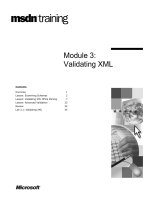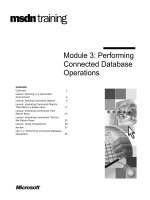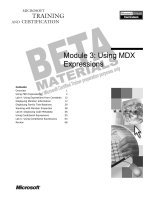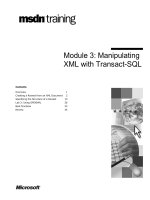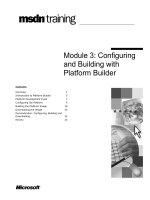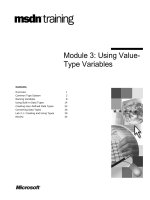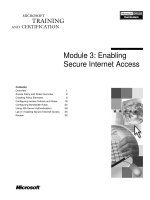Module 3 - OSPF Network Types pot
Bạn đang xem bản rút gọn của tài liệu. Xem và tải ngay bản đầy đủ của tài liệu tại đây (561.68 KB, 22 trang )
© 2008 Cisco Systems, Inc. All rights reserved. Cisco ConfidentialBSCI
1
BSCI Module 3 Lesson 4 - OSPF Network Types
OSPF
© 2008 Cisco Systems, Inc. All rights reserved.BSCI
2
CCNP – BSCI Bachkhoa Networking Academy
Học viện mạng Bách Khoa - www.bkacad.com
Objective
OSPF Network Types
Adjacency Behavior for a Point-to-Point Link
Adjacency Behavior for a Broadcast Link
Selecting the DR and BDR
Adjacency Behavior for a NBMA Network
DR Election in NBMA Topology
OSPF Over Frame Relay
OSPF over NBMA Topology Modes
© 2008 Cisco Systems, Inc. All rights reserved.BSCI
3
CCNP – BSCI Bachkhoa Networking Academy
Học viện mạng Bách Khoa - www.bkacad.com
Different Network Types and OSPF
There are three distinct classifications of physical network media that
OSPF can differentiate between. Each of these network types requires a
slightly different configuration to optimize the performance of OSPF.
Cisco IOS Software allows five main network types to be configured, as
displayed in Table 5-5.
© 2008 Cisco Systems, Inc. All rights reserved.BSCI
4
CCNP – BSCI Bachkhoa Networking Academy
Học viện mạng Bách Khoa - www.bkacad.com
OSPF Network Types
© 2008 Cisco Systems, Inc. All rights reserved.BSCI
5
CCNP – BSCI Bachkhoa Networking Academy
Học viện mạng Bách Khoa - www.bkacad.com
Configuring the Network Type
OSPF is highly adaptable. Consider its capability to accommodate either
broadcast or nonbroadcast multiaccess (NBMA) network types. OSPF
responds accordingly by altering its operation to reflect the configuration
that you have given it.
© 2008 Cisco Systems, Inc. All rights reserved.BSCI
6
CCNP – BSCI Bachkhoa Networking Academy
Học viện mạng Bách Khoa - www.bkacad.com
Broadcast Networks
Set an interface to operate in broadcast network mode when the network
is a fully meshed.
When this command is applied to an interface, OSPF elects a DR/BDR,
builds an adjacency with the DR, and builds neighbor relationships with all
other OSPF routers in the network.
© 2008 Cisco Systems, Inc. All rights reserved.BSCI
7
CCNP – BSCI Bachkhoa Networking Academy
Học viện mạng Bách Khoa - www.bkacad.com
Nonbroadcast Networks
When configuring an interface as nonbroadcast, OSPF cannot perform
multicasting on that link.
Lack of multicast functionality impacts OSPF’s operation because OSPF
Hellos cannot be properly transmitted.
Physical Frame Relay interfaces and multipoint subinterfaces are
recognized as nonbroadcast by default. The following alternatives allow
you to make OSPF operate when a nonbroadcast type network is
encountered:
–Change the network type of OSPF. This is the easiest change
but is not possible in every instance.
–Manually define the neighbors. This forces adjacencies that
are created by sending unicast Hello packets.
–Alter the behavior of the Layer 2 protocol.
© 2008 Cisco Systems, Inc. All rights reserved.BSCI
8
CCNP – BSCI Bachkhoa Networking Academy
Học viện mạng Bách Khoa - www.bkacad.com
Nonbroadcast Networks
© 2008 Cisco Systems, Inc. All rights reserved.BSCI
9
CCNP – BSCI Bachkhoa Networking Academy
Học viện mạng Bách Khoa - www.bkacad.com
Point-to-Multipoint Networks
OSPF point-to-multipoint interfaces are defined as numbered point-to-
point subinterfaces, with the router having one or more OSPF neighbors.
An OSPF point-to-multipoint network has the following benefits compared
to nonbroadcast multiaccess and point-to-point networks:
–Point-to-multipoint is easier to configure because it requires no
configuration of neighbor commands. Point-to-multipoint
connections consume only one IP subnet and require no
designated router election process.
–Point-to-multipoint has a fully or partial meshed topology.
–Point-to-multipoint can be more reliable in fully meshed
networks because it maintains connectivity in case of virtual
circuit failure.
–When you configure the OSPF network type as point-to-
multipoint, routing between two routers not directly connected
goes through the router (hub) that has virtual circuits to both
routers (spokes).
© 2008 Cisco Systems, Inc. All rights reserved.BSCI
10
CCNP – BSCI Bachkhoa Networking Academy
Học viện mạng Bách Khoa - www.bkacad.com
Point-to-Multipoint Networks
© 2008 Cisco Systems, Inc. All rights reserved.BSCI
11
CCNP – BSCI Bachkhoa Networking Academy
Học viện mạng Bách Khoa - www.bkacad.com
Point-to-Point Networks
When you configure an interface as an OSPF point-to-point network type,
this command understands that the only other OSPF-speaking router on
that interface is directly connected.
As previously mentioned, the following methods can be used to get OSPF
to operate in such a configuration:
–Use point-to-point subinterfaces
–Use a physical interface and an OSPF point-to-point network type
© 2008 Cisco Systems, Inc. All rights reserved.BSCI
12
CCNP – BSCI Bachkhoa Networking Academy
Học viện mạng Bách Khoa - www.bkacad.com
Adjacency Behavior for a Point-to-Point Link
Hello time 10s, Dead time 40
Neighboring routers become adjacent whenever they
can communicate directly
Usually, the IP source address of an OSPF packet is
set to the address of the outgoing interface on the
router.
© 2008 Cisco Systems, Inc. All rights reserved.BSCI
13
CCNP – BSCI Bachkhoa Networking Academy
Học viện mạng Bách Khoa - www.bkacad.com
Adjacency Behavior for a Broadcast Link
Reduce routing update traffic
Manage link-state synchronization
Note:
After a DR and BDR have been selected, any router added to the
network establishes adjacencies with the DR and BDR only.
© 2008 Cisco Systems, Inc. All rights reserved.BSCI
14
CCNP – BSCI Bachkhoa Networking Academy
Học viện mạng Bách Khoa - www.bkacad.com
Selecting the DR and BDR
It is more efficient to have one router represent the
other routers to a new router rather than all the routers
pass the same information.
© 2008 Cisco Systems, Inc. All rights reserved.BSCI
15
CCNP – BSCI Bachkhoa Networking Academy
Học viện mạng Bách Khoa - www.bkacad.com
Setting Priority for DR election
The BDR uses the wait timer to determine whether the
DR is out of service.
© 2008 Cisco Systems, Inc. All rights reserved.BSCI
16
CCNP – BSCI Bachkhoa Networking Academy
Học viện mạng Bách Khoa - www.bkacad.com
Adjacency Behavior for a NBMA Network
If the NBMA topology is not fully meshed, a broadcast
or multicast sent by one router will not reach all the
other routers.
To implement broadcasting or multicasting router
replicates the packets sends them individually on each
permanent virtual circuit (PVC)
Hello Time 30s; Dead Time 120s
© 2008 Cisco Systems, Inc. All rights reserved.BSCI
17
CCNP – BSCI Bachkhoa Networking Academy
Học viện mạng Bách Khoa - www.bkacad.com
DR Election in NBMA Topology
© 2008 Cisco Systems, Inc. All rights reserved.BSCI
18
CCNP – BSCI Bachkhoa Networking Academy
Học viện mạng Bách Khoa - www.bkacad.com
OSPF Over Frame Relay
© 2008 Cisco Systems, Inc. All rights reserved.BSCI
19
CCNP – BSCI Bachkhoa Networking Academy
Học viện mạng Bách Khoa - www.bkacad.com
OSPF over NBMA Topology Modes of
Operation
RFC 2328-compliant modes are as follows:
–Nonbroadcast (NBMA)
–Point-to-multipoint
Additional modes from Cisco are as follows:
–Point-to-multipoint nonbroadcast
–Broadcast
–Point-to-point
ip ospf network [{broadcast | non-broadcast | point-to-
multipoint [non-broadcast] | point-to-point}]
This interface command defines OSPF network type.
Router(config-if)#
© 2008 Cisco Systems, Inc. All rights reserved.BSCI
20
CCNP – BSCI Bachkhoa Networking Academy
Học viện mạng Bách Khoa - www.bkacad.com
Activity
3.4.1 Drag and Drop: OSPF Network Types
–Upon completion of this activity, the student will be able to
identify the different OSPF network types.
3.4.4 Checkbox: DR and BDR Election
–Upon completion of this activity, the student will be able to
identify the process of DR and BDR election.
© 2008 Cisco Systems, Inc. All rights reserved.BSCI
21
CCNP – BSCI Bachkhoa Networking Academy
Học viện mạng Bách Khoa - www.bkacad.com
Q and A
© 2008 Cisco Systems, Inc. All rights reserved.BSCI
22
CCNP – BSCI Bachkhoa Networking Academy
Học viện mạng Bách Khoa - www.bkacad.com
